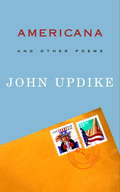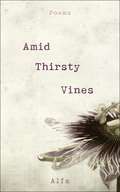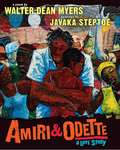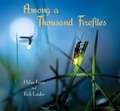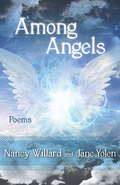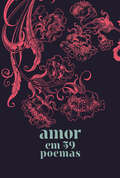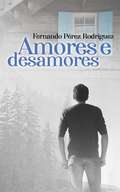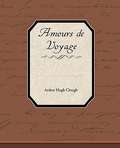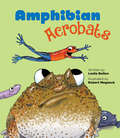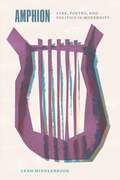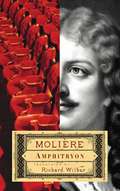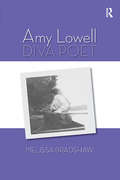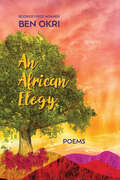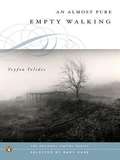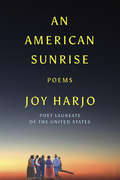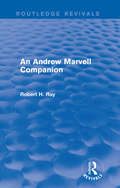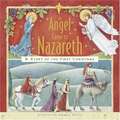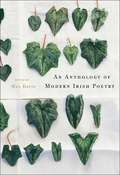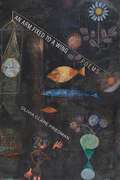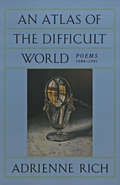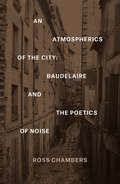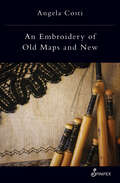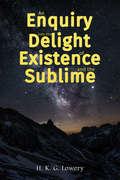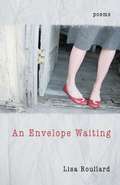- Table View
- List View
Americana
by John UpdikeJohn Updike's first collection of verse since his Collected Poems, 1953-1993 brings together fifty-eight poems, three of them of considerable length. The four sections take up, in order: America, its cities and airplanes; the poet's life, his childhood, birthdays, and ailments; foreign travel, to Europe and the tropics; and, beginning with the long "Song of Myself," daily life, its furniture and consolations. There is little of the light verse with which Mr. Updike began his writing career nearly fifty years ago, but a light touch can be felt in his nimble manipulation of the ghosts of metric order, in his caressing of the living textures of things, and in his reluctance to wave goodbye to it all.From the Hardcover edition.
Amid Thirsty Vines: Poems
by AlfaThemes of self-discovery, tending the garden of the soul, and nurturing yourself into blossom, Amid Thirsty Vines by Instagram poetry star Alfa is the collection you need to feel the power of the beautiful flowers within you, and to find the love you deserve. This volume belongs in the collection of every modern poetry fan.
Amiri and Odette
by Walter Dean MyersPresents a modern, urban retelling in verse of the ballet in which brave Amiri falls in love with beautiful Odette and fights evil Big Red for her on the streets of the Swan Lake Projects.
Among A Thousand Fireflies
by Helen Frost Rick Lieder<P>On a summer evening, just as the stars blink on, a firefly lands on a flower. Lights start to flash all around her -- first one, then three, seven. Hundreds. Thousands. How will she find just one flash among them? And will he see her flash in return? <P>In evocative photographs and lyrical language, Rick Lieder and Helen Frost, creators of the critically acclaimed Step Gently Out and Sweep Up the Sun, offer a true story of how two fireflies come together after finding each other's light among thousands of others.
Among Angels
by Jane Yolen Nancy WillardA magical, whimsical, and heart-soaring collection of angelic poetry from two award-winning literary masters Acclaimed novelist Nancy Willard and World Fantasy Award and Nebula Award-winning author and editor Jane Yolen collaborate on this magnificent anthology of their original poetry. For years the 2 friends and literary colleagues have shared a mutual fascination with God's winged messengers and exchanged angel poems--some reverent, some witty, some sweet, some biting, and each one a miraculous invention. Now these wondrous flights of angelic fancy are gathered together in a singular collection of breathtaking verse. Rooted in the Christian and Hebrew traditions, these brief, lyrical masterworks celebrate the heavenly beings that have flown through our collective imagination for centuries: Gabriel and the archangel Michael, the fallen Lucifer and the Angel of Death. In rich and sumptuous poetry, the authors muse on angels' flight, feathers, faith, writing on pinheads, and the glory and inconvenience of having wings. To luxuriate in Yolen and Willard's poetic words, ideas, and unforgettable images is to truly fly among angels.
Amor em 59 poemas
by Vários AutoresAMOR - Sentimento que induz a aproximar, a proteger ou a conservar a pessoa pela qual se sente afeição ou atracção; grande afeição ou afinidade forte por outra pessoa. Descubra o único sentimento que faz girar o mundo através das palavras de poetas de diferentes tempos e lugares. Meu coração tardou. Meu coração Talvez se houvesse amor nunca tardasse; Mas, visto que, se o houve, o houve em vão, Tanto faz que o amor houvesse ou não. Tardou. <P><P>Antes, de inútil, acabasse. Meu coração postiço e contrafeito Finge-se meu. Se o amor o houvesse tido, Talvez, num rasgo natural de eleito, Seu próprio ser do nada houvesse feito, E a sua própria essência conseguido. Mas não. Nunca nem eu nem coração Fomos mais que um vestígio de passagem Entre um anseio vão e um sonho vão. Parceiros em prestidigitação, Caímos ambos pelo alçapão. Foi esta a nossa vida e a nossa viagem. Fernando Pessoa
Amores e desamores: Poemas de amor y desamor, Emociones Sentimientos Amor Desamor
by Fernando Pérez Rodríguez"Amores e desamores" é um livro de poesia que, como seu nome indica são poesias de amor e desamor, poesias en rima livre, escritas com o coração e que pretendem que ol leitor se sinta identificado com elas y sinta os mesmos sentimentos y emoções que ol autor ao escrevê-las.
Amours De Voyage
by Arthur Hugh CloughOver the great windy waters, and over the clear-crested summits, Unto the sun and the sky, and unto the perfecter earth, Come, let us go,--to a land wherein gods of the old time wandered, Where every breath even now changes to ether divine. <P> <P> Come, let us go; though withal a voice whisper, 'The world that we live in, Whithersoever we turn, still is the same narrow crib; 'Tis but to prove limitation, and measure a cord, that we travel; Let who would 'scape and be free go to his chamber and think; 'Tis but to change idle fancies for memories wilfully falser; 'Tis but to go and have been.'--Come, little bark! let us go.
Amphibian Acrobats
by Leslie BulionLeslie Bulion and Robert Meganck are back with another cross-curricular celebration of science and poetry—this time starring frogs, toads, salamanders, and more. Step right up and learn all about the remarkable stars of Leslie Bulion's Amphibian Acrobats show! Marvel at the jaw-dropping dexterity of "Daredevil Free-Climbers," the astounding agility of "The Olympic Jumpers," the awe-inspiring stamina of the intrepid "Marathoners," and more! Leslie Bulion's lively poems pair with Robert Meganck's colorful, zany art in this cross-curricular celebration of science and language. Thorough back matter includes a science glossary, notes on poetry forms, and resources for additional information about these extraordinary animals.
Amphion: Lyre, Poetry, and Politics in Modernity (Thinking Literature)
by Leah MiddlebrookA reintroduction to the myth of Amphion, recovering an overlooked sphere of lyric tradition. Amphion is the figure in Greek mythology who played so skillfully on a lyre that stones moved of their own accord to build walls for Thebes. While Amphion still presides over music and architecture, he was once fundamental to the concept of lyric poetry. Amphion figured the human power to inspire action, creating and undoing polities by means of language. In contrast to the individual inspiration we associate with the better-known Orpheus, Amphion represents the relentless, often violent, play of harmony and disorder in human social life. In this wide-ranging study, Leah Middlebrook introduces readers to Amphion-inspired poetics and lyrics and traces the tradition of the Amphionic from the Renaissance through modernist and postmodern poetry and translation from the Hispanic, Anglophone, French, Italian, and ancient Roman worlds. Amphion makes a significant contribution to scholarship on the connection between poetry and politics and the history of the lyric, offering an account well-suited to our times.
Amphitryon
by Molière Richard Wilbur"Richard Wilbur's translations of classic French drama are among the undiscovered treasure of our recent literature."-The Hudson ReviewMolière's late, elegant comedy, based on Plautus' Roman version, alludes to the love affairs of the French king. This is the fourth and final volume of Theatre Communication Group's series (with cover designs by Chip Kidd), completing trade publication of these vital theatrical works. ncludes Richard Wilbur's translation notes.Richard Wilbur is a two-time winner of the Pulitzer Prize, and a former poet laureate of the United States. His verse translations of Molière's plays have been performed for audiences throughout the world.
Amy Lowell, Diva Poet: Diva Poet
by Melissa BradshawIn her reassessment of Amy Lowell as a major figure in the modern American poetry movement, Melissa Bradshaw uses theories of the diva and female celebrity to account for Lowell's extraordinary literary influence in the early twentieth century and her equally extraordinary disappearance from American letters after her death. Recognizing Amy Lowell as a literary diva, Bradshaw shows, accounts for her commitment to her art, her extravagant self-promotion and self-presentation, and her fame, which was of a kind no longer associated with poets. It also explains the devaluation of Lowell's poetry and criticism, since a woman's diva status is always short-lived and the accomplishments of celebrity women are typically dismissed and trivialized. In restoring Lowell to her place within the American poetic renaissance of the nineteen-teens and twenties, Bradshaw also recovers a vibrant moment in popular culture when poetry enjoyed mainstream popularity, audiences packed poetry readings, and readers avidly followed the honors, exploits, and feuds of their favorite poets in the literary columns of daily newspapers. Drawing on a rich array of letters, memoirs, newspapers, and periodicals, but eschewing the biographical interpretations of her poetry that have often characterized criticism on Lowell, Bradshaw gives us an Amy Lowell who could not be further removed from the lonely victim of ill-health and obesity who appears in earlier book-length studies. Amy Lowell as diva poet takes her rightful place as a powerful writer of modernist verse who achieved her personal and professional goals without capitulating to heteronormative ideals of how a woman should act, think, or appear.
An African Elegy: Poems
by Ben OkriThis moving poetry collection from the Booker Prize–winning author finds strength and hope while reflecting on the complex issues that have burdened Africa.First published in 1992, Ben Okri&’s remarkable debut collection features poems that are now considered classics and taught in schools and universities worldwide. Here he plays with the mystique of the African continent, countering simplistic narratives of suffering that have been imposed on it with vibrant, nuanced portraits of the traditions and resilience of African peoples. An invaluable window onto Okri&’s experiences as a Nigerian immigrant to the United Kingdom and as a writer discovering his calling, these poems also speak to universal truths about love, injustice, and the search for meaning.
An Almost Pure Empty Walking
by Tryfon TolidesIn his debut collection, chosen by Mary Karr as a winner of the 2005 National Poetry Series, Tryfon Tolides weaves together poems that speak of desire, loss, and small joys. Tolides was born in a tiny village in Greece and his work is rooted in the mountains and wind and the deep interior of that place; his poems express a longing and a searching for peace, for home, for beauty, for escape. These poems constitute a lament, whether they concern themselves with the difficulties of assimilation or the question of whether it is possible for people to live with one another in a spirit of true understanding. They prove that the physical and the metaphysical can share residence, can even be one and the same. .
An American Sunrise: Poems
by Joy HarjoA nationally best-selling volume of wise, powerful poetry from the first Native American Poet Laureate of the United States. In this stunning collection, Joy Harjo finds blessings in the abundance of her homeland and confronts the site where the Mvskoke people, including her own ancestors, were forcibly displaced. From her memory of her mother’s death, to her beginnings in the Native rights movement, to the fresh road with her beloved, Harjo’s personal life intertwines with tribal histories to create a space for renewed beginnings.
An Andrew Marvell Companion (Routledge Revivals #Vol. 1243)
by Robert H. RayFirst published in 1998, this title provides for the reader of the renowned metaphysical poet and politician a valuable reference and resource volume. It is a compendium of useful information for any reader of Andrew Marvell, including crucial biographical material, historical contextualisation, and details about his life’s work. The intention throughout is to enhance understanding and appreciation, without being exhaustive. The major portion of the volume, in both importance and size, is ‘A Marvell Dictionary’. Its entries are arranged alphabetically: they identify, describe and explain the most influential persons in Marvell’s life and works, as well as places, characters, allusions, ideas, concepts, individual words, phrases and literary terms that are relevant to a rounded appreciation of his poetry and prose. An Andrew Marvell Companion will prove invaluable for all students of English poetry and seventeenth-century political history.
An Angel Came to Nazareth: A Story of the First Christmas
by Anthony KnottAS THE FIRST Christmas draws near, four travelers must make their way from Nazareth to Bethlehem. An angel asks four animals to choose which traveler they would like to carry. The horse chooses the brave soldier; the camel, the wise king; the ox, the good Samaritan. But the donkey, who chooses the poor woman with child, discovers that his humble-looking passenger is the one carrying the greatest of them all. Through its simple rhymes and lavish illustrations, this book conveys the very special spirit of the season.
An Anthology of Modern Irish Poetry
by Wes DavisNever before has there been a single-volume anthology of modern Irish poetry so significant and groundbreaking as An Anthology of Modern Irish Poetry. Collected here is a comprehensive representation of Irish poetic achievement in the twentieth and twenty-first centuries, from poets such as Austin Clarke and Samuel Beckett who were writing while Yeats and Joyce were still living; to those who came of age in the turbulent '60s as sectarian violence escalated, including Seamus Heaney and Michael Longley; to a new generation of Irish writers, represented by such diverse, interesting voices as David Wheatley (born 1970) and Sinéad Morrissey (born 1972). Scholar and editor Wes Davis has chosen work by more than fifty leading modern and contemporary Irish poets. Each poet is represented by a generous number of poems (there are nearly 800 poems in the anthology). The editor's selection includes work by world-renowned poets, including a couple of Nobel Prize winners, as well as work by poets whose careers may be less well known to the general public; by poets writing in English; and by several working in the Irish language (Gaelic selections appear in translation). Accompanying the selections are a general introduction that provides a historical overview, informative short essays on each poet, and helpful notes--all prepared by the editor.
An Anthology of the New England Poetry from Colonial Times to the Present Day
by Louis UntermeyerThis is a magnificent collection of poetry. The editor features the famous along with such lesser-known poets as Edward Taylor, Jones Very, William Ellery Channing II, Frederick Goddard Tuckerman and Anne Bradstreet, the first female (and Puritan) poet to be published. Introductory comments are interesting. "Here Cain and Abel come to sacrifice; Fruits of the Earth and Fatlings each do bring: On Abel's gift the fire descends from Skies, But no such sign on false Cain's offering. With sudden hateful looks he goes his ways, Hath thousand thoughts to end his brothers days, Upon whose blood his future good he hopes to raise. Who fancies not his looks now at the Bar ? His face like death, his heart with horror fraught. No Malefactor ever felt like war When deep despair with wish of life hath fought. Branded with guilt and crusht with treble woes, A Vagabond to Land of Nod he goes; ..." (Bradstreet) "
An Arm Fixed to a Wing: Poems
by Olivia Clare FriedmanOlivia Clare Friedman’s An Arm Fixed to a Wing seeks out the spiritual elements that haunt the everyday, the divine wing fastened to an earthly arm. Elegies and poems of nostalgia appear alongside pieces celebrating the speaker’s present moment, with the underlying knowledge that such moments slip past too easily. Several poems explore the theme of motherhood—the excitement and novelty, the routine and translucent sleeplessness. At the book’s center sits a sequence of narrative pieces, titled “Camera Poems,” exploring experiences of isolation, hopefulness, and self-awareness. While the poems in An Arm Fixed to a Wing acknowledge that loss is a constant, their tone is frequently wistful, evoking the desire to recover feelings of attentiveness and wonder toward one’s surroundings, both the mundane and the extraordinary.
An Atlas of the Difficult World: Poems 1988-1991
by Adrienne RichWinner of the Los Angeles Times Book Prize. In this, her thirteenth book of verse, the author of "The Dream of a Common Language" and "Snapshots of a Daughter-in-Law" writes of war, oppression, the future, death, mystery, love and the magic of poetry.
An Atmospherics of the City: Baudelaire and the Poetics of Noise (Verbal Arts: Studies in Poetics)
by Ross ChambersWhat happens to poetic beauty when history turns the poet from one who contemplates natural beauty and the sublime to one who attempts to reconcile the practice of art with the hustle and noise of the city?An Atmospherics of the City traces Charles Baudelaire’s evolution from a writer who practices a form of fetishizing aesthetics in which poetry works to beautify the ordinary to one who perceives background noise and disorder—the city’s version of a transcendent atmosphere—as evidence of the malign work of a transcendent god of time, history, and ultimate destruction.Analyzing this shift, particularly as evidenced in Tableaux parisiens and Le Spleen de Paris, Ross Chambers shows how Baudelaire’s disenchantment with the politics of his day and the coincident rise of overpopulation, poverty, and Haussmann’s modernization of Paris influenced the poet’s work to conceive a poetry of allegory, one with the power to alert and disalienate its otherwise inattentive reader whose senses have long been dulled by the din of his environment.Providing a completely new and original understanding of both Baudelaire’s ethics and his aesthetics, Chambers reveals how the shift from themes of the supernatural in Baudelaire to ones of alienation allowed a new way for him to articulate and for his fellow Parisians to comprehend the rapidly changing conditions of the city and, in the process, to invent a “modern beauty” from the realm of suffering and the abject as they embodied forms of urban experience.
An Embroidery of Old Maps and New
by Angela CostiI can see how I carry Yiayia's war in the ample dunes of my belly, the moment she smelt the guns, she pinched the candle's wick,gathered the startled shadows of her children,flung my baby-mother onto her backand sprinted towards the neutral moon—Migration and the memories of women's traditions are woven throughout these poems. Angela Costi brings the world of Cyprus to Australia. Her mother encounters animosity on Melbourne's trams as Angela learns to thread words in ways that echo her grandmother's embroidery. Here are poems that sing their way across the seas and map histories.
An Enquiry into the Delight of Existence and the Sublime
by H. K. G. LoweryIn his debut collection of poetry, H. K. G. Lowery explores a journey incorporating all the natural anxieties and pains of living, leading to an understanding of real forgiveness and redemption.From the first poem of the collection, An Ode to Father John Misty, he sets the scene touching on societal issues such as racism, homophobia, religion, addiction and consumerism. The darkness of such issues, as well as other emotional issues, are given light gradually when he journeys into the positive attributes of forgiveness, hope in the God, the wonderment of nature, self-acceptance and salvation. The collection begins to rotate towards the Sublime with A Requiem for St. Francis which holds a strong personal resonance from the time he visited Assisi in Italy.Each poem commences with an epigraph which summarises each individual poem. The final poem sees all twelve epigraphs combine into a conclusion of the collection which results in a cathartic outpouring where the delight of existence is realised.An Enquiry into the Delight of Existence and the Sublime is a personal journey, a rise from darkness to light, from despair to hope.
An Envelope Waiting
by Lisa RoullardPoems in this book by Lisa Roullard explore the world of mail: sometimes the poet escapes into it, sometimes the mailman from it. Themes of waiting and dating also surface and postage stamps capture first dates in Washington State. In 2013 poems from this collection placed first in the Utah Original Writing Competition.
